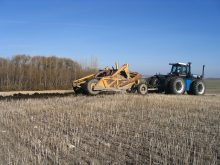Among the many collaborative RNA interference projects GreenLight is conducting around the continent, there are two canola protection projects at the University of Manitoba dealing with flea beetles and sclerotinia.
Although the two projects are independent of each other, both are being conducted by Steve Whyard, researcher in the biological sciences department.
One line of research is aimed at protecting canola from flea beetles. The other is aimed at protecting canola from sclerotinia.
“In both cases, the expected result will be that if an insect or a fungus lands on a leaf that’s been sprayed with the GreenLight double-stranded RNA, then the pest will ingest or absorb the double-stranded RNA,” explains Whyard, adding that the double-strand process is called RNA interference (RNAi).
Read Also

More work wanted on removing red tape
REGINA — Canadian farmers risk falling further behind competitors if two main federal agencies don’t become more efficient and responsive…
“Normally RNA is single stranded. For example, the RNA in people is single-stranded. But when you present a living thing with double-stranded RNA, every living organism has the ability to recognize that it’s foreign. The organism will take the double-stranded RNA and use it as a guide to destroy any similar sequence.
“We use this technology to attack genes that are essential to the life of that organism. Because this new double-stranded RNA sequence is specific to just one characteristic of that one pest only, it won’t impact any other organisms.”
On the flea beetle front, Whyard says he’s been testing a whole fleet of different RNAi samples, feeding them to flea beetles in the lab. He says they need to know which molecules are effective at killing the beetles. Most of the RNAi tests did not kill the beetles. However, they recently identified a handful of double-stranded RNA samples that are effective at killing flea beetles and have no impact on other insects.
On the sclerotinia front things are moving a bit quicker. Whyard says they expect to start field trials this year, but they’re waiting for the green light from the Canadian Food Inspection Agency and the Pest Management Regulatory Agency.
“From a safety point of view, we felt it would be easier to contain a product aimed at a fungus. We felt it would be more difficult to contain a product aimed at insects. We can control small patches of field trials on fungus. Insects are always on the move, so we’ll wait to do those field trials.
“I’d say we’re probably looking at 2024 before we see registration for both products.”

















